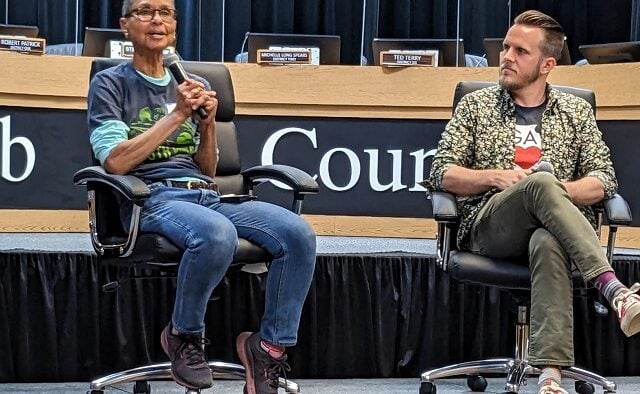From Decaturish

DeKalb County, GA — DeKalb County Commissioner Ted Terry hosted an event at the Maloof Auditorium to kick off a “DeKalb Green New Deal” initiative on April 17.
Additional events during Earth Week include webinars on clean energy, environmental justice, and green jobs from April 18-20. Terry will speak at Decatur’s Earth Day celebration on April 22.
In addition, Terry plans to introduce a resolution to allocate $100,000 in American Rescue Plan Act funds for a Green New Deal development fund at the Board of Commissioners meeting on April 18.
“As we know, climate change is already here,” Terry said while explaining why he feels DeKalb needs the initiative to address climate change. “Georgia is one of the fastest warming states in the country.”
Storms are increasing in frequency and severity, causing more frequent flooding, which puts lives and property at risk and strains emergency services, Terry said. Heat waves, flooding, and erosion will affect agriculture in many parts of the state and strain the power grid and other infrastructure.
Terry says that the goal of a DeKalb Green New Deal is to simultaneously address the effects of climate change on the county while creating new jobs through renewable energy, energy efficiency, and green infrastructure.
A Federal Green New Deal introduced by Senator Bernie Sanders and Representative Alexandria Ocasio-Cortez in 2019 did not pass. Still, some of the same policies were incorporated into the Inflation Reduction Act of 2022.
Terry said that hundreds of millions of dollars are available through grants from the Environmental Protection Agency, the Department of Energy, and the US Department of Agriculture.
“This really is the best time to act,” Terry said.
Terry said that less than 2% of DeKalb County remains undeveloped, including 3000 acres of the South River Forest. Most of the forest is currently zoned industrial, therefore, not protected. The South River Forest also includes the proposed site of the controversial police training facility called “Cop City” by activists.
Dr. Jacqueline Echols, Board President of the South River Watershed Alliance (SWRA), said that she got involved in conservation because of a 1999 consent decree between the EPA and the City of Atlanta, which came about because the city was dumping raw sewage into the Chattahoochee and South Rivers. She began work related to the consent decree after receiving her doctorate in Political Science from Clark Atlanta in 1999.
Echols said that the South River is a headwater of the Ocmulgee-Altamaha River Basin, which drains about one-quarter of the state of Georgia, and is one of the three largest river basins in the Eastern Seaboard.
Echols said that DeKalb has been the major source of sewage pollution in that river system since 1961, and in 2010, five decades of violations resulted in an EPA-enforced consent decree.
Echols said that 76% of residents along the upper South River corridor from south Atlanta to south DeKalb County are Black. Eighty-six percent are non-white people of color. Pollution contributes to significantly higher rates of health problems such as asthma among those populations, who are 80-100% more likely to live near wastewater discharge.
“What’s going on with the Atlanta forest is probably one of the most horrific environmental injustices that is taking place in this country today,” Echols said.
Echols explained that despite some improvements, Atlanta and DeKalb wastewater still pollutes the South River water system, affecting everything downstream, including places like Macon that take drinking water from the Ocmulgee watershed.
“The system operates by overflowing. So, you need the green space along the creek and the river to clean the water as it moves downstream,” Echols said.
Increased stormwater due to climate change, along with any development that will increase runoff, is likely to worsen existing erosion and pollution problems, which will cost taxpayers money to fix.
“The city of Stonecrest has committed over a million dollars to dealing with the stormwater at Panola Shoals. It comes from Atlanta. It comes from upstream,” Echols said.
Echols said that SRWA does cleanups, water sampling, and advocacy. The organization is currently working on encouraging recreational use of the river, which is key to dismantling what Echols calls a “culture of avoidance” and improving water quality. Echols said that since the Georgia Environmental Protection Department prioritizes recreational areas, encouraging recreational use is part of protecting the river.
Terry said that in addition to offering information, part of the purpose of the events this week is to seek input about the community’s priorities. Terry said that the resolution he presents to the Board of Commissioners on April 18 only sets aside money and that specific projects will be brought back before the board for a vote.
“For instance, last year, we did $10,000 to the Decatur Greenway to build a bioswale,” Terry said. At least 40% of the fund will go to communities impacted the most by climate change and environmental injustice, including those along the upper South River corridor described by Echols.
Terry said that Special Purpose Local Option Sales Tax (SPLOST) funding could be used in addition to the ARPA funds for some of this work. Terry said that the legislature has passed a new “clean” SPLOST for DeKalb, and the Board of Commissioners will meet next Thursday at 10 am to discuss projects.
Terry said that he hopes to build on past successes and plans to hold a DeKalb Green New Deal summit on Oct. 14 of this year to discuss what has been accomplished up to that point.
“We can lead for ourselves and encourage others by doing so,” Terry said.
